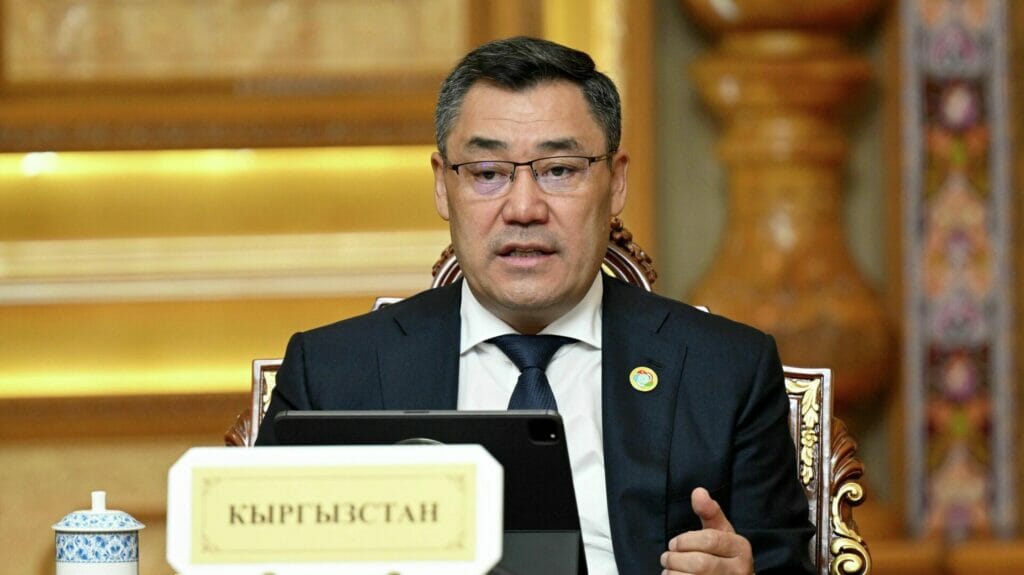Kyrgyzstan changes its approach to water source management due to deficit of water in the region

President Sadyr Japarov of Kyrgyzstan said that Central Asian countries have to introduce resource-saving technologies and announced his country’s transition to a water conservation policy, the president’s press service reported.
What has the Kyrgyz president suggested? During his speech at the V Consultative Meeting of the Central Asian leaders in Dushanbe, Tajikistan, Japarov proposed establishing a regional center for introducing energy-efficient and resource-saving technologies in Bishkek.
As the president noted, the new regional center will let countries of the region improve their management of water and energy resources.
Why does Kyrgyzstan opt for a water conservation policy? Over the past several years, the region has been facing abnormal colds, long-term droughts and shortages of water, the president noted.
The president of Kyrgyzstan has also underlined that despite the shortage of water his country is fully meeting its obligations in terms of water resources. However, it is time for Kyrgyzstan to drop the consumer approach and switch to conservation policy, according to the president.
«No glaciers, no water. No water, no life. If just one country hasn’t resolved its water and energy problems, it will affect all other Central Asian countries,» Japarov highlighted.
Why do Central Asian countries need to combine their efforts? The president has proposed that all interested parties combine their efforts to attract necessary investments and advanced technologies in Kyrgyzstan’s water industry because the country accounts for about half of all water resources in the region.
Japarov also suggested resuming cooperation between Kazakhstan, Kyrgyzstan, Uzbekistan and Tajikistan in terms of using the water and energy potential of the Naryn River and Syrdarya River.
He believes that these measures will allow the region to improve its water and energy management as well as to make it more resilient to the power of nature.
President Kassym-Jomart Tokayev of Kazakhstan also spoke during the meeting where he proposed certain initiatives for joint work.
Even though Kyrgyzstan had planned to export its drinking water throughout Asia, Europe and China, it declared a state of emergency due to a severe shortage of water for agricultural purposes.
During his visit to Xinjiang, China, Japarov pointed out the unrealized potential of water resources in Kyrgyzstan and said that his government is ready to facilitate any bilateral cooperation in this sphere.
In August, Kyrgyzstan stopped irrigation water from the Kirov reservoir from being exported to Kazakhstan, as the Kazakh side had reached the ceiling of 3.54 million cubic meters of water that the two countries had agreed upon.
At the end of July, the government of Kyrgyzstan declared a state of emergency due to a shortage of power within the country, which, in turn, was caused by a deficit of water. The state of emergency will last until December 31, 2026.
Southern regions of Kazakhstan are almost dependent on water supply from Kyrgyzstan. For example, about 80% of irrigation water in the Jambyl region comes from the neighboring state, according to a joint report by Vlast, a Kazakhstani media outlet, and Kloop, a Kyrgyz media outlet, conducted in 2021.
According to a statute signed in 1983, Kazakhstan and Kyrgyzstan share water resources of the Chu River, Talas River and the Tortogul water reserve. Adbybai Jailoobayev, deputy head of the Water Resources Service of Kyrgyzstan, says that the Kyrgyz side possesses 52% of the Chu River, while 48% of it belongs to Kazakhstan. The Talas Rives is shared by 50/50. According to Jailoobayev, the statute signed back in the Soviet times requires Kyrgyzstan to give water to Kazakhstan.

